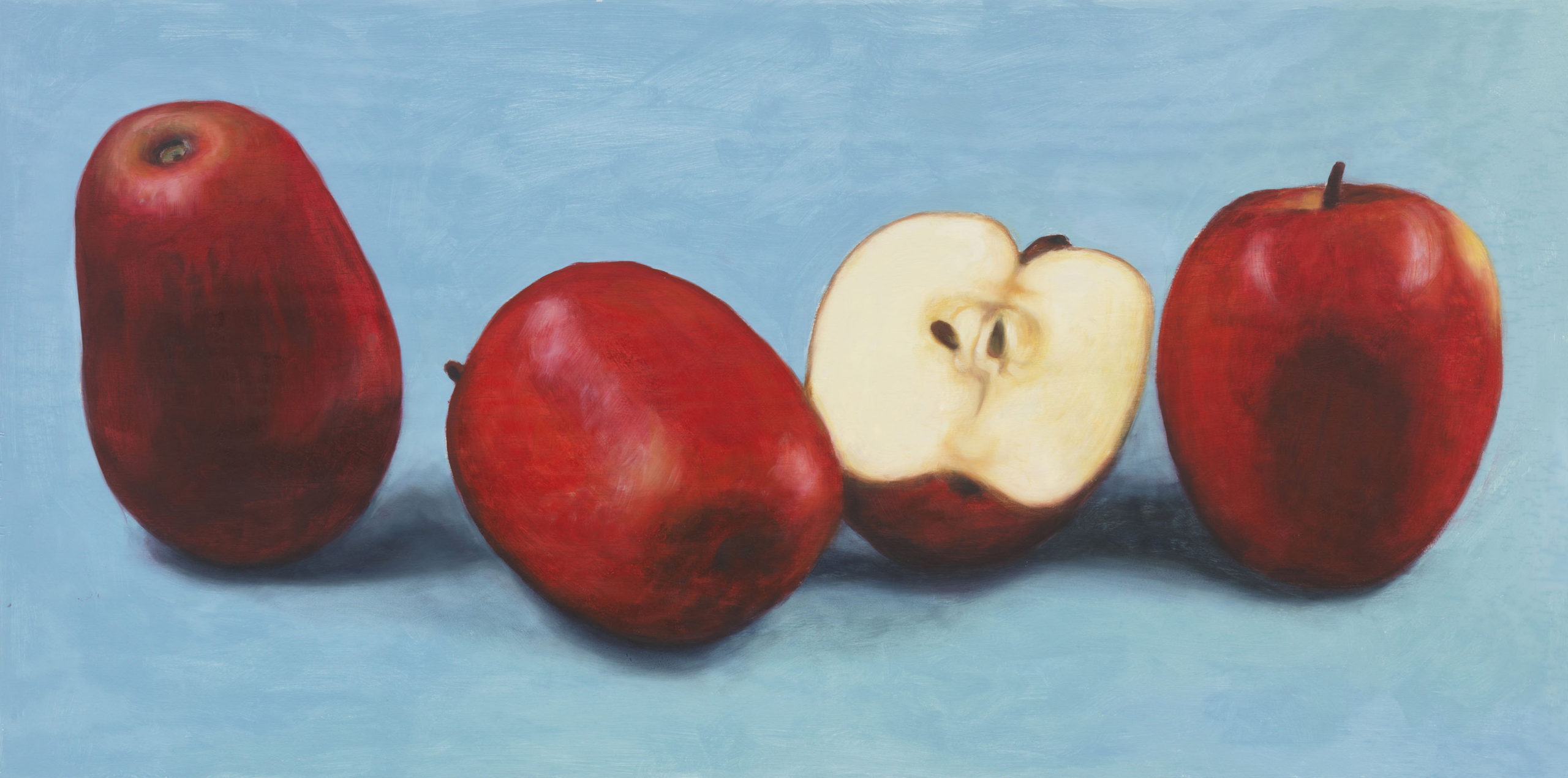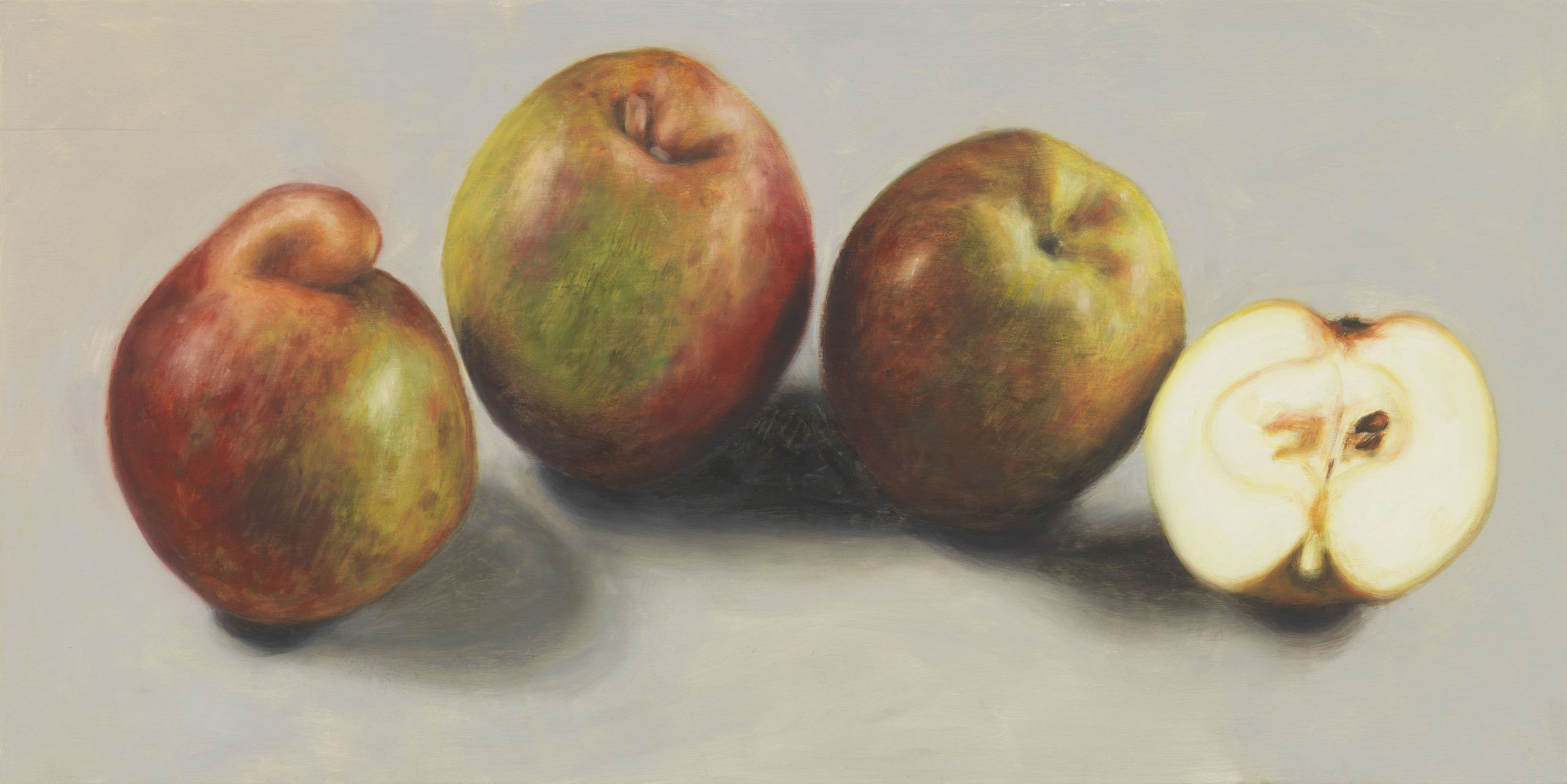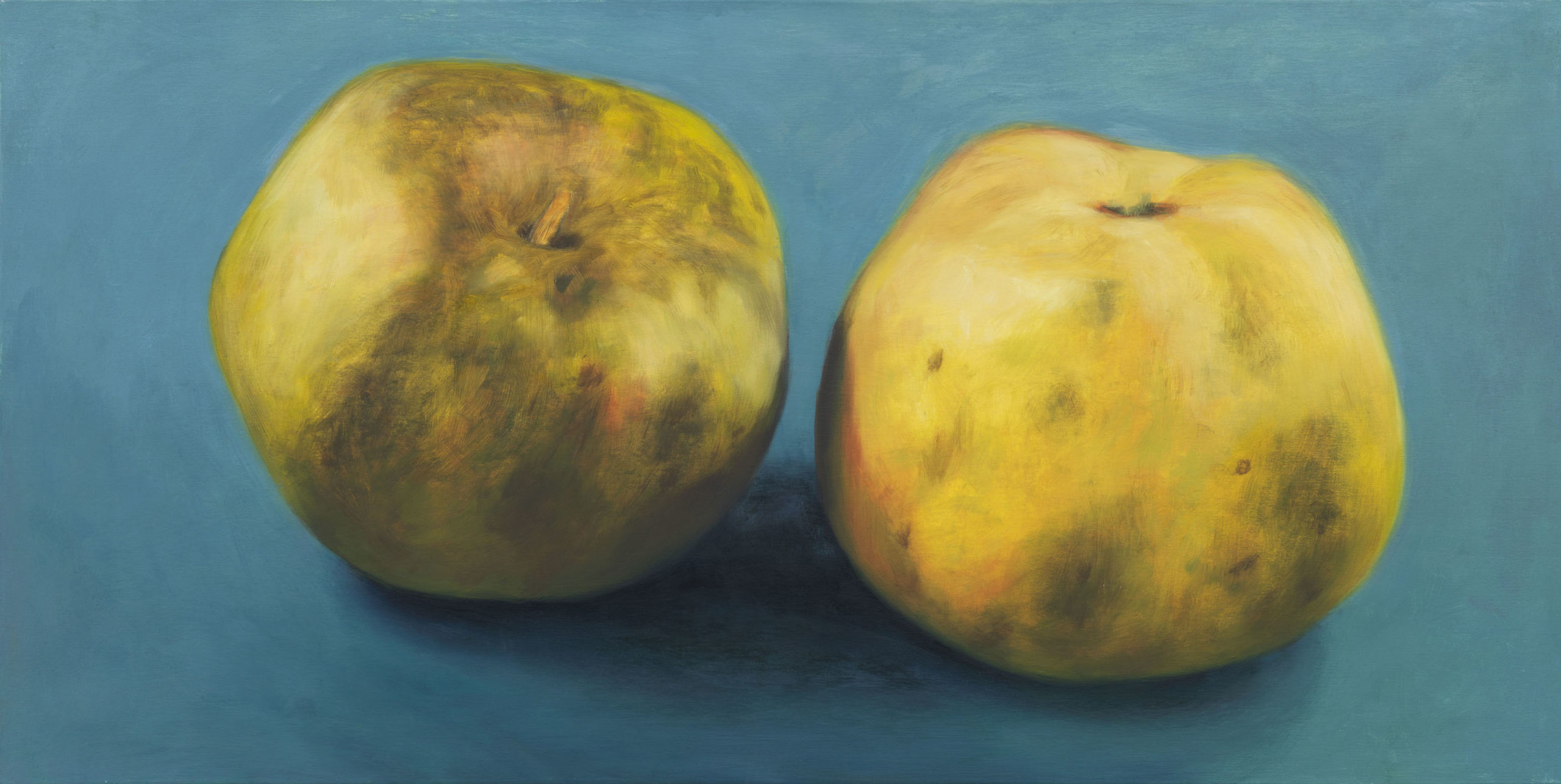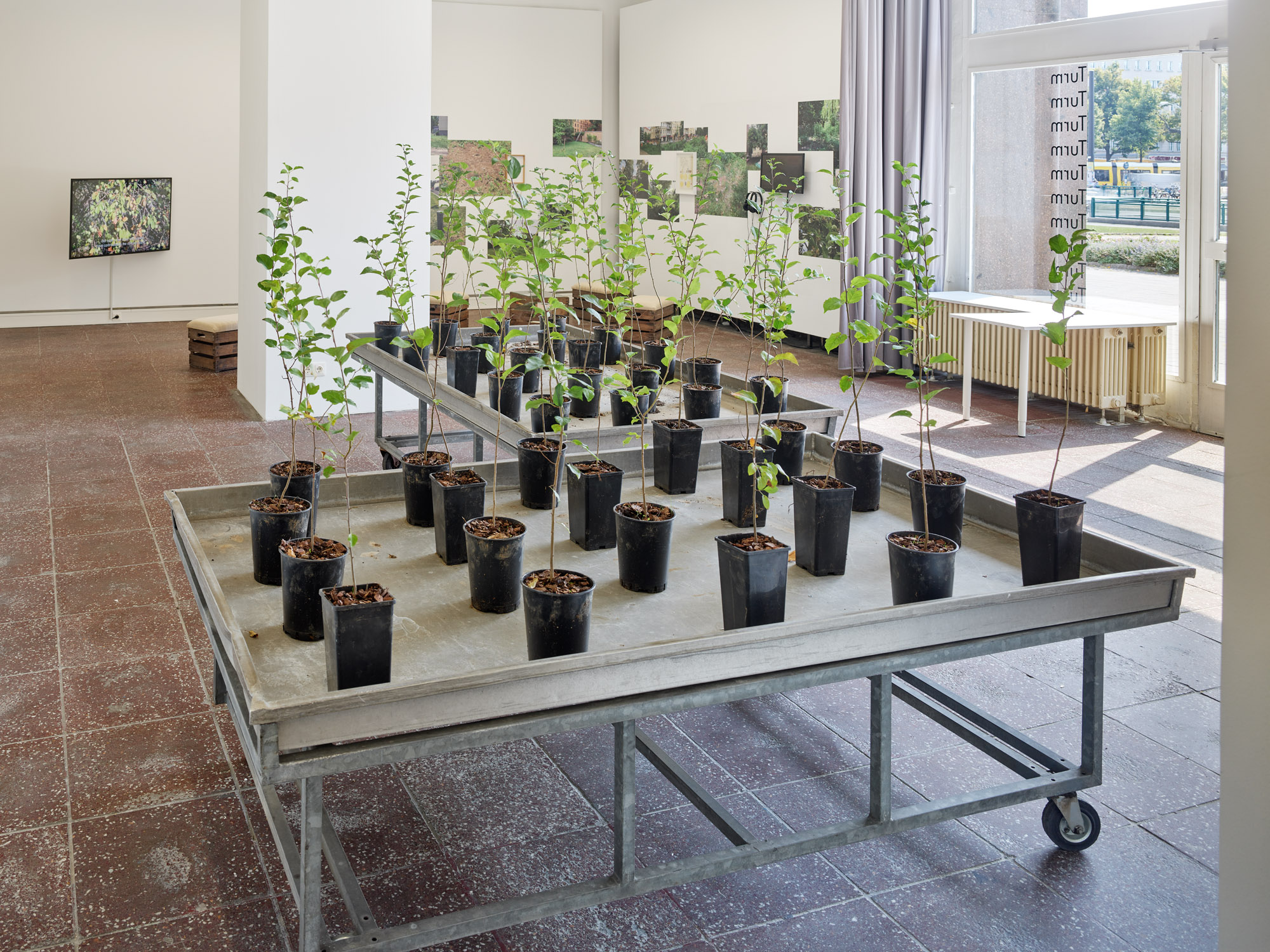Apple. An Introduction. (Over and over and once again)
Antje Majewski & Paweł Freisler
30 August – 20 October 2019
Galerie im Turm
with Piotr Życieński and Anja Fiedler / Apfelschätze
as well as Eckart Brandt, Marco Clausen, Friederike Habermann, Maike Majewski, Konstantin Schroth, Kulturagenten für kreative Schulen, Carl-von-Linné-Schule, Fichtelgebirge Grundschule, Friedensburg-Oberschule, Fritz-Karsen-Schule, Kita Goethestraße, Heinrich-von-Stephan-Schule, Hector-Peterson-Schule, Rosa-Parks-Grundschule
curated by Lena Johanna Reisner
Antje Majewski’s artistic practice is sustained by long-term conversations with artists, cultural workers, researchers from the humanities and the natural sciences, activists and others. Through her formal language, which draws on artistic research as well as curatorial and documentary work, Majewski not only emphasises an ecology of aesthetic and social relations but also brings her process-based practice to a place, an occasion, but never to completion.
The dialogue between Antje Majewski and Paweł Freisler stretches back to 2010. At that time, Majewski was investigating the work of the Polish conceptual artist for the first time, through fictitious trips made in collaboration with Agnieszka Polska. In 2011/12, in her exhibition Die Gimel-Welt. Wie man Objekte zum Sprechen bringt (‘The World of Gimel: How to Make Objects Talk’), Majewski presented Freisler’s work Standard-Ei (‘Standard Egg’) within a highly complex conceptual frame. While the original object – a stainless steel form used to define the shape of the ideal chicken egg – was hidden away from exhibition viewers in a bank safe, Majewski buried a copy of the egg in her garden. In the ensuing correspondence with Freisler, Majewski admitted to and explained the reasons for this unauthorised action, retrospectively obtaining Freisler’s understanding and consent. The next step for Majewski, as planned, was to plant an apple tree on the stainless-steel egg. The derivative versions of this plan resulted from an ongoing, philosophical-poetic email correspondence between Majewski and Freisler, who in 2013 detailed more about his own preoccupation with the apple, and agreed to make a shared exhibition project. In 2014/15, this exhibition became manifest as the first version of Apple. An Introduction. (Over and over and once again) at the Muzeum Sztuki in Łódź. Freisler made it a pre-condition that the exhibit should only be about apples, that the artists should never meet, and that 1,001 trees should follow the first apple tree planted in Majewski’s garden. Apart from this, he gave Majewski total freedom. Apple. An Introduction. (Over and over and once again) was subsequently realised at the Museum Abteiberg in Mönchengladbach, at Kunsthalle Lingen and at Kaleidoskop Worpswede.
The story of its development and its conceptual framing accompany the project at every exhibition site as a part of its DNA. Rather than being pared down, these elements are constantly further developed. With every iteration, new conversations are initiated, new apple trees are planted, elements are added or transform themselves. The project reacts to each new location, expanding or contracting; documentation and text materials arise, overlapping one another like sediments, building a humous, a nutrient-rich ground, which serves as a point of departure for research and enables new encounters to take place.

Antje Majewski, Nathusius' Taubenapfel, 2014, Oil on wood, 40 x 80 x 3 cm, Courtesy the artist and neugerriemschneider, Berlin

Antje Majewski, Pommerscher Krummstiel 2014, Oil on wood, 40 x 80 x 3 cm, Courtesy the artist and neugerriemschneider, Berlin

Antje Majewski, Uelzener Kalvill, 2014, Oil on wood, 40 x 80 x 3 cm, Courtesy the artist and neugerriemschneider, Berlin
2019, however, is a peculiar year. And Berlin is a peculiar city. 2019 is a year in which people are beginning to describe climate change as a climate catastrophe, in which movements such as Fridays for Future and Extinction Rebellion are gaining influence, in which cities and states worldwide are acknowledging the climate’s state of emergency, in which environmental political challenges are discussed with a new sense of urgency, in which political parties that, over previous decades, failed to realise a sensible climate policy, are now attempting to run election campaigns on the question. 2019 is a year in which we are talking about the death of forests, about bark beetle plagues and spruce tree monocultures, about deforestation and CO2 reservoirs. It is a year in which those forests that we call the lungs of the earth are burning. It is a year of humility.
The artistic gesture of tree-planting has a number of prominent antecedents. But in the light of current events, its meaning has shifted. Today, above all, what type of tree is planted is decisive. A cultivated apple tree, if it stays healthy and is well-looked after, can produce fruit for many generations. This makes it a key resource. But not every type of apple is resistant to the same degree against the changes in the micro-climate predicted for the coming decades. And each species has a preference for specific sites and soils. In a city such as Berlin, the search for a suitable, publicly accessible and stable site for the planting of a cultivated tree is no trivial matter. Public space is dense, and is often interlaced with conflicting interests and needs. Even planting a single tree is an important act. Every tree is a gift: not only in and of itself, but through the fact that it tests how we might structure urban resilience; how we might make our cities sustainable into the future. What priority do places of natureculture, or urban gardens, have in this context? What possibilities for action do we have as citizens to structure urban space, and how can we grow beyond our role as consumers in this task? Because the climate catastrophe and the ensuing ecological crisis demand of us not only conscious consumer decisions, but also an active engagement and concern for our environment, understood in a positive sense.
Alongside the central theme of the apple itself – and the planting of apple trees – questions of biodiversity and the maintenance of species also play a key role in the exhibition. In her series of paintings of ancient apple varieties, Antje Majewski took as a point of departure the photographic still lives of Eckart Brandt. The pomologist maintains an orchard of fruit tress in Helmste, Niedersachsen, where he already has gathered hundreds of different sorts of apple. Brandt also appears in Majewski’s documentary film Wilde Äpfel (‘Wild Apples’), which can be understood as a critique on the conditions of contemporary apple production. In conversation with producers, wholesalers and pomologists in China, Kazakhstan, Morocco, Poland and Germany, Majewski draws a sketch of which varieties are currently overrepresented on the market, and why it is simpler to market a smaller range, restricting biodiversity. In a comparison between large-scale apple plantations and smaller orchards, topics such as differing approaches to pesticides and herbicides are addressed. A broad spectrum is opened out between new, highly cultivated varieties and industrial production versus wild apples in – as far as is possible – untouched forest regions. Also addressed is the question of how, in a context of advancing climate change, to provide adequate nutrition via – in the best case – sustainably produced food, while preserving ancient species of cultivated and wild apples at the same time.
Events
3/9/19 | 7–9pm
Panel discussion | Commons
with Eckart Brandt, Marco Clausen and Friederike Habermann, moderated by Maike Majewski (in German language)
The event takes place at alte feuerwache – studiobühne as part of KGB-Kunstwoche
15/9/19 | 11am–4pm
Harvesting with Apfelschätze on overgrown plantations in Potsdam-Grube
6/10/19 | 1–6pm
Apple Festival at Galerie im Turm with a juice cycle by Maike Majewski, pomologist Hans-Georg Kosel, a selection of apple cakes by Helen Russell Brown, and live music by Gal Liraz and Tobias Meyer
20/10/19 | 12–2pm
Apple tree planting and workshop for adoptive tree-parents with Konstantin Schroth
1/9–30/10/19
Apple tree plantings and programmes in schools, organized by Apfelschätze and Konstantin Schroth in collaboration with Kulturagenten für kreative Schulen
3.9. | 19–21 Uhr
Panel discussion: Commons
with Eckart Brandt, Marco Clausen and Friederike Habermann, moderated by Maike Majewski (in German language)
an event by Galerie im Turm as part of KGB-art week
The exhibition project Apple. An Introduction. (Over and over and once again) offers occasion for a conversation on the Commons – and the act of Commoning – as strategies for structuring open spaces in the urban environment. In particular in a city such as Berlin, public space forms through the overlapping nature of various interests and forms of use, which in part exist in contradiction to one another. How might places of nature-culture be structured within this conflict-ridden field? Under the growing pressure of climatic mutations and ecological crisis, questions of biodiversity are increasingly important as a central component for resilient natural-cultural systems. How might the Commons and Commoning, as frameworks for action and shared economies, contribute to increased resilience, biodiversity and justice: both between and for future generations? What implications might this have both for private and economic interests and for administrative structures? Eckart Brandt (pomologist, Boomgarden-Projekt for the collection of old varieties of fruits), Marco Clausen (Prinzessinnengarten) and Friederike Habermann (economist, Commons researcher and activist) discuss their perspectives on biodiversity, urban use and the economy of the Commons.
Eckart Brandt, pomologist (expert in fruit tree science) and writer, has been active as a fruit tree farmer since 1983. In 1985, he called the Boomgarden Projekt into being, and has since collected hundreds of ancient fruit species. His “living collection” was initially planted on rented land, before being brought long-term to land provided by Judith Bernhard, Eckart Brand’s wife. As genetic resources and living witnesses to agricultural heritage, the trees are now hosted at the 3.85 hectare-large Boomgarden Park Helmste – which is currently being secured under a not-for-profit foundation. Since 1993, Brandt has been a member of the Pomologist’s Association, which acknowledged his significant engagement in 2001 with the Oberdieck Prize. At the Expo 2015 in Milan, which took place under the motto Feeding the Planet, Energy for Life, Brandt acted as Idea Ambassador for Species Diversity for the German Pavillon.
Marco Clausen is co-founder of Prinzessinnengarten (2009) and the Nachbarschaftsakademie (2015). He organises events, workshops, programs for international visitors, and study and research projects on topics such as food sovereignty, rural-urban relationships, robust social and ecological urban development, the Commons and social-economic transformation, with a special focus on self-organised forms of collective learning. In 2012, Clausen initiated a campaign that was signed by 30,147 people called Wachsen lassen! (“Let it grow!”), which successfully prevented the planned privatisation of Prinzessinnengarten. Together with the Initiative Prinzessinnengarten Kreuzberg, Clausen is currently campaigning to secure the open urban space at Moritzplatz for the next 99 years. In 2018, together with Kerstin Meyer, he formulated a plan for a “permanent garden in Berlin”, and is currently part of the working group for the exhibition and educational project Licht Luft Scheisse. Perspektiven auf Ökologie und Moderne (“Light Air Shit. Perspectives on Ecology and Modernism”).
Dr. Friederike Habermann, economist, historian and writer, has been active in social movements since 1980. Her particular focus lies in the relationship between the economy and other power relationships. In 1998, Habermann took on the press coordination for global networking of the grassroots movement People’s Global Action (PGA). Since this point, she works as a researcher and activist with the notion of the Commons, through, among others, the Commons-Institut. She has been living in Commons-based projects for the last 15 years, and participates in the networking of solidary economies beyond the logic of exchange. In her book Ecommony. UmCARE zum Miteinander (2016) she teases out the question of how a commons-based society could become a reality. Her first favourite song was In meinem kleinen Apfel (“In my little apple”).
Maike Majewski, environmental educator, translator and writer, is since 2012 the coordinator of Transition Town Pankow, a neighbourhood sustainability project that is part of the international transition movement. As of 2016, she is active in the Berlin Ernährungsrat (“Nutrition Advisory Board”), a coalition of actors from civil society working for the ecologically sustainable and socially just production and distribution of food in Berlin. In the framework of the Open Source Circular Economy Days, Majewski is engaged in topics relating to the nutrition and nutrient cycle. For the exhibition Apple. An Introduction. (Over and over and once again), she has developed the experiential and pedagogical project Der Saftkreislauf’ (“The Juice Cycle”), which she will introduce at the Apple Festival in cooperation with Apfelschätze and Kulturagenten für kreative Schulen.
Credits
Translations: Sonja Hornung
Project assistance: Luzie Naters
Assistance public programme: Felix Brieden, Helen-Sophie Mayr
Technical team: Carolina Redondo, Claudio Aguirre, Johann Hackspiel
The artists and the curator wish to thank the team of Galerie im Turm and Kunstraum Kreuzberg/Bethanien, namely: Stéphane Bauer, Ferdinand Gieschke, Daniel Noack, Nadia Pilchowski and Sylvia Sadzinski, as well as the team of exhibition guards and mediators; neugerriemschneider, Berlin, for the loans; all participating adoptive tree-parents and supporters of the project.
The project is realised in collaboration with the faculty of green areas in the municipal office of Friedrichshain-Kreuzberg and Turgut Altuğ (Grüne Fraktion, Berlin).
Supported by the Senate Department for the Environment, Transport and Climate Protection; the Senate Department for Culture and Europe: Exhibition fund for municipal galleries and fund for artist remuneration, as well as the project fund of the district Friedrichshain-Kreuzberg. Galerie im Turm is an institution of the municipality Friedrichshain-Kreuzberg.































































